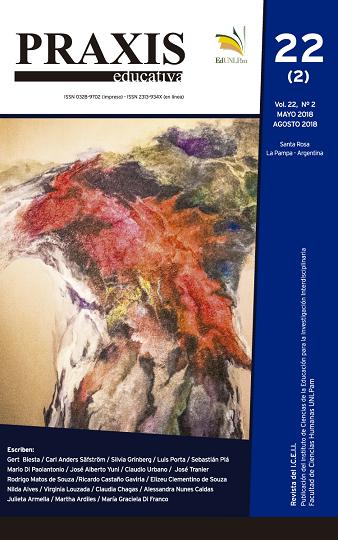A Manifesto for Education Ten Years On: On the Gesture and the Substance
DOI:
https://doi.org/10.19137/praxiseducativa-2018-220204Keywords:
manifest, education, freedom, fightAbstract
After ten years of publication of the "Manifesto for education" we can affirm that it did not seek to be a model for the future of education nor was it conceived to be, but nevertheless tried to express something "about" education and something "for" The education. In that sense, the "Manifesto" tried to express real and incessant concerns, for which "it is worth fighting," whenever we consider that "fighting" is perhaps too strong a notion in a world characterized by tension and conflict. In the lines that are expressed below, we share some reflections about said manifesto, being aware that its traces and concerns are latent in those who consider education as a space of complete freedom.
Downloads
References
Biesta, G.J.J. (2011). Disciplines and theory in the academic study of education: A Comparative Analysis of the Anglo-American and Continental Construction of the Field” en Pedagogy, Culture and Society.Año19. Nº 2. pp.175-192.
Biesta. G.J.J. (2014). The beautiful risk of education. Boulder, Co: Paradigm Publishers.
Biesta, G.J.J. (2015). “Resisting the Seduction of the Global Education Measurement Industry: Notes on the Social Psychology of PISA” enEthics and education. Año10. Nº 3. pp. 348-360.
Böhm, W. (2017). Die pädagogische Placebo-Effekt. Zur Wirksamkeit der Erziehung. [The educational placebo-effect. On the effectiveness of education.] Paderborn:Ferdinand Schöningh.
Gössling, H.J. (1993). Subjektwerden: Historisch-systematische Studien zu einer pädagogischen Paradoxie. [Becoming a subject: A historical and systematic exploration of an educational paradox.] Weinheim: Deutscher Studien Verlag
Downloads
Published
Issue
Section
License
Copyright Notice
Editorial Committee Educational Praxis Magazine:
I hereby declare that I am the author of the article titled (article name), that it is original and my own and that it was not previously published in any other format or medium. I declare to know that the magazine will not charge me any type of fee under any circumstances, nor will I receive any type of monetary compensation If it were accepted for publication in Educational Praxis, I authorize the aforementioned magazine to publish it digitally and to advertise it on its social networks.
If the work is published, I adhere to the Creative Commons license called "Attribution - Non-Commercial Share Alike CC BY-NC-SA", through which it is allowed to copy, reproduce, distribute, publicly communicate the work and generate derivative works, as long as when the original author is cited and acknowledged. This license has been used since September 2018. In 2016 CC BY NC ND 4.0 was adhered to; and in the years 2017 and 2018 (January-August) CC BY NC 4.0.
This CC BY-NC-SA Share Alike license does not, however, permit commercial use of the work. As an author, the journal may establish additional agreements for the non-exclusive distribution of the version of the work published in the journal, it allows me to self-archive the published articles, in their post-print version, in institutional, thematic repositories, personal web pages or any other relevant use. with the recognition of having been first published in this journal.
Educational Praxis adheres to DORA (Declaration on Research Assessment) signed in San Francisco, California, on December 16, 2012, and to the Declaration of Mexico (Joint Declaration LATINDEX - REDALYC - CLACSO - IBICT).















_(1)2.png)


3.png)











_(2).png)






2.jpg)









